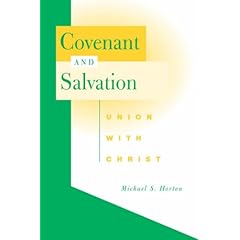 This is one of the most aware and hopeful accounts of Reformation Theology that the reader will ever see. It is incredibly relevant to the current world of theology. Horton begins with the presupposition not only that “the Reformation tradition” contains a huge amount of “unexploited potential” for engaging this current world, but that this potential is found within the framework of Covenant Theology.
This is one of the most aware and hopeful accounts of Reformation Theology that the reader will ever see. It is incredibly relevant to the current world of theology. Horton begins with the presupposition not only that “the Reformation tradition” contains a huge amount of “unexploited potential” for engaging this current world, but that this potential is found within the framework of Covenant Theology. Horton traces the two covenants, “the covenant of Law,” given to (and broken by) both Adam and Israel, and the “covenant of Promise,” given to Noah, Abraham, David, and ultimately fulfilled in Christ. He distinguishes these two covenants, based on research done not only by Reformed biblical scholarship, but also “from Jewish and Roman Catholic traditions” (including the work of Cardinal Joseph Ratzinger) that has found two ancient kinds of covenants: a “suzerainty” treat, often given from a stronger king to a weaker king in the form, “do this and you will live,” and a covenant of Promise, given in the form of “a royal grant,” which took the form of “an outright gift of a king to a subject.”
“The covenant at Sinai certainly bears the marks of a suzerainty treaty. In fact, the exact form is followed in Exodus 19 and 20 as well as in Deuteronomy 5: Yahweh identifies himself as the suzerain (preamble), with a brief historical prologue citing his deliverance of the people from Egypt, followed by the Ten Commandments (stipulations), with clear warnings (sanctions) about violating the treaty to which they have sworn their allegiance.” (pg 13.)
The covenant with Noah, Abraham and David is given in “a completely different form,” a “one-sided promise on God’s part with no conditions attached (see Genesis 9). “The point is this: the deepest distinction in Scripture is not between the Old and New Testaments, but between the covenants of law and the covenants of promise that run through both” (pg 17, emphasis in original).
From this point, Horton engages all of the many theologies that are being presented today, beginning with the “New Perspective on Paul,” (the “covenant nomism” of which takes into account the covenant of Law, but not the covenant of Promise,” but along the way, he engages not only Sanders, Dunn and Wright, but also Rahner and Von Balthasar, Barth and Hunsigner, Milbank and Ward, Tillich, Moltmann, and a host of others. Along the way, Horton brings home with power and dignity the genius of the Reformers, and he shows how the genius of the Reformers is not only relevant in today’s thought climate, but ideal.
This is a thoughtful, erudite, and masterful work.

No comments:
Post a Comment